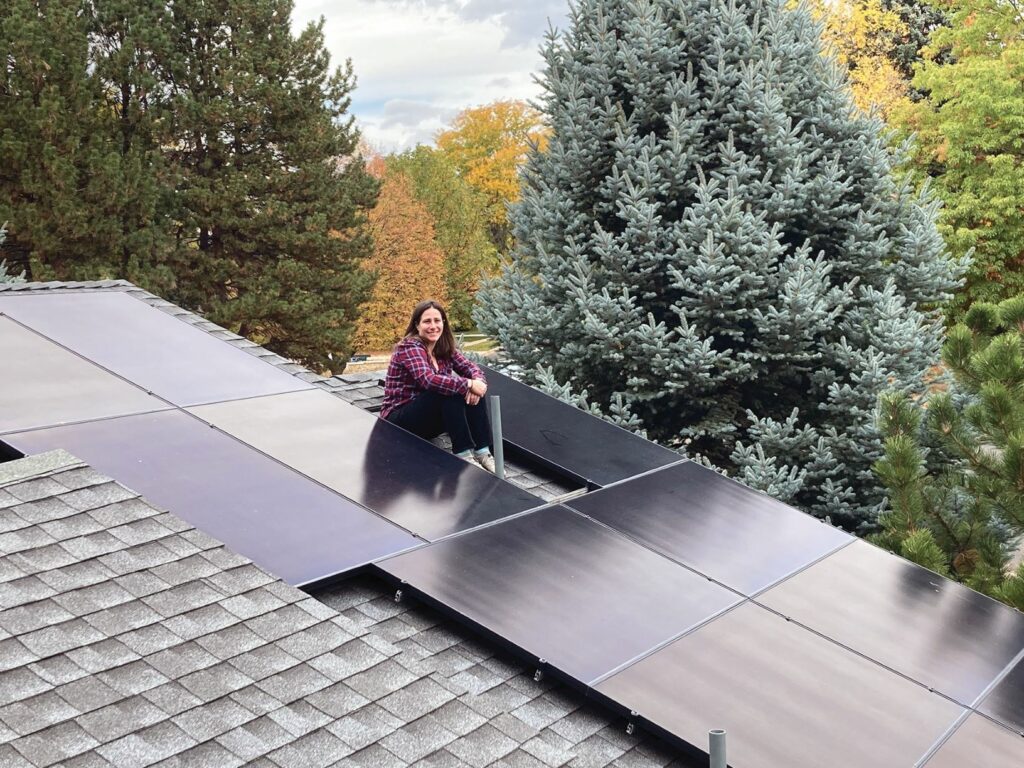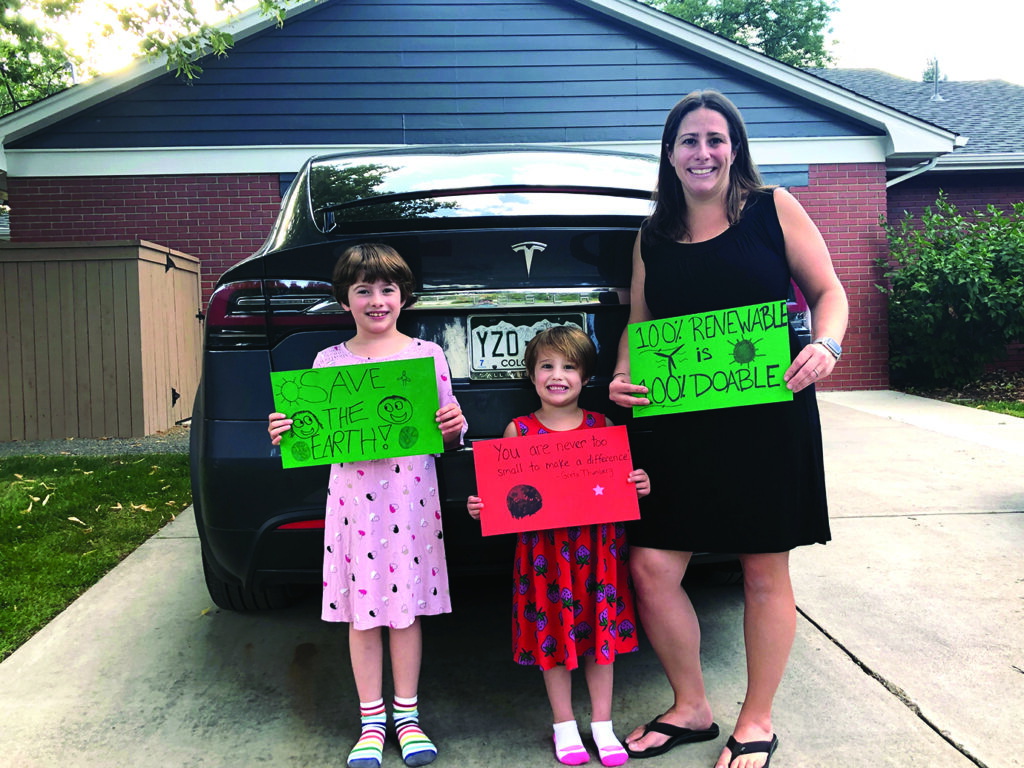Environmental impact and long-term savings are two common reasons people hear for switching to renewable energy. Stacy Decker and her husband would cite these as major factors, but it was ultimately a small – yet mighty – voice that pushed them to make the change.
“My husband and I are both environmental scientists, and so it’s something that was always on our radar to do,” Decker said. “But then it was actually our daughter who came home from school one day and was like, ‘We need to reduce our carbon footprint,’ and ‘What’re we gonna do?’
So we said, ‘Okay, it’s time. Let’s do it.’”

gas after installing solar on her home last year
Photos courtesy of Stacey Decker
The family began their journey to reducing their carbon footprint by researching whether an electric car or solar energy would be the better option for them. After receiving pricier solar bids than anticipated, they decided to purchase an electric car in the summer of 2019.
But they did not stop there.
Decker stumbled upon an article about Solar United Neighbors, SUN, and the national non-profit’s first solar co-op program in Denver. She joined the co-op and had her panels installed by December of 2019 with a “significant” difference in price compared to her earlier bids because of the co-op group purchase and a federal tax rebate.
So although not everyone has a persuasive 9-year-old pushing them towards renewable energy, Denver residents can look to SUN for guidance in their solar journey by joining SUN’s second Denver Solar Co-op.
Joining a co-op is free, and members are not obligated to make any purchases. Once they reach a threshold of solar-interested candidates, SUN reaches out to local solar installers to compare pricing. Meanwhile, co-op members are surveyed on their ranking of selection priorities like pricing, number of people employed by an installer, locality of the business, etc. Then a selection committee chooses a group installer, and SUN gives the company the list of co-op members for them to contact with individual proposals. This process is cost-free until they sign a contract with the installer. Co-op members can also use SUN as a resource throughout the solar installation process for questions or issues.
“We basically serve as essentially a personal consultant for those members,” Program Director for Colorado SUN Bryce Carter said. “If folks want us to be an extra set of eyes on their proposal, we’re happy to do that.”
Denver city and county residents and small businesses can join SUN’s second Denver Solar Co-op until March 1, 2021. They are up to 100 co-op members with a goal of reaching 150.
Jonathan Rogers, a renewable energy specialist for the city of Denver, is a big proponent of SUN and its solar co-op. He even joined the co-op himself at the start of 2021 and expects to go solar sometime next month.
“It’s effectively my job to transition all of Denver… to 100 percent renewable electricity as quickly and equitably as possible,” Rogers said. “The mayor has set out an objective to do that transition by 2030.”
But this goal has its obstacles. Not everyone owns a home, has enough money to put down or even qualifies for a loan to do so. Solar co-ops can help by offering competitive pricing and connecting people to informational resources, but the city of Denver as well as Colorado SUN is looking to community solar projects to expand accessibility.
The city of Denver is looking into nine different projects around Denver, four of which would be at local recreation centers as covered parking. These parking-lot projects will send 80 percent of the power back to city facilities, but 20 percent will be sent to low-income housing and low-income residents, according to Rogers.
“Working with groups like Energy Outreach Colorado to connect those folks who are struggling the most… we can help them save on their bills where they don’t need to put solar on their roof, they don’t need to put any money down,” Rogers said. “We can just assign them bill credits from the community solar projects.”

Decker has continued her commitment to solar by becoming a member of Colorado SUN’s state advisory board. In her role, she works to create more solar co-ops and expand community solar.
“The whole idea is just to make it more affordable and more accessible for anyone who wants it,” Decker said. “With community solar, you purchase or you can lease a share – kind of like a subscription – within a community solar project that will offset your electricity costs.”
The energy produced by your share of the community solar panels gives you a credit on your electricity bill. This makes it a great option for renters and others who cannot put panels on their own homes.
Another way Colorado SUN is working to expand access to solar energy is through the Colorado Pay As You Save, PAYS, program in partnership with SUN and other Colorado organizations. The program allows electric-utility customers, both homeowners and renters, to make home energy improvements, like adding solar panels, at no upfront cost. The initial cost is paid for by the utility, but they recover this cost by charging customers on a monthly basis in an amount that does not exceed their estimated savings. This allows customers to save money throughout the process and own the equipment once the utility regains the cost of its investment. Carter said this program allows SUN to address a critical gap in accessing energy improvement resources.
“You have those that have the ability to have credit or even cash to be able to pay for those improvements… and then you have people that are below federal poverty level and they can receive support and funding through a variety of programs,” Carter said. “In between, you have people that may not be qualified under the poverty level, but also may not have the credit or even available credit that they want to use for these types of improvements which could help improve their cash flow as well as just their living comfort. So Pay As You Save helps solve this by basically eliminating the need to take on debt or any credit for the consumer.”
On top of offering a wide variety of services and resources, Colorado SUN is focused on the bigger picture.
“It’s about building a movement,” Carter said. “And everyone’s welcome to join.”
To learn more about Colorado SUN, go to https://www.solarunitedneighbors.org/colorado/

Be the first to comment